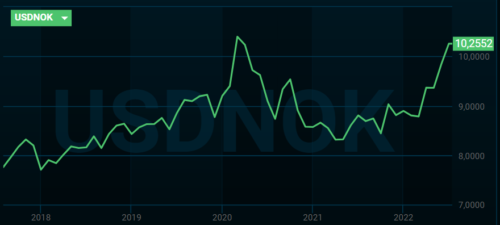USD-euro parity adds to the challenges facing the fish feed sector.
For the first time in 20 years, earlier this week, the US dollar hit the same value as the euro. For the fish feed sector in North America, this might not mean much but the situation is different for the European side.
“The general situation is that supplies of all sorts are getting more expensive. The situation with the currency is not making it easier,” Aller Aqua’s Group Vice President Henrik T. Halken said discussing the impact on the company’s operations in Europe.
With most raw materials trade in US dollars, the stronger dollar adds to the the extra costs hitting the fish feed sector at a time when they are wrestling with rising prices and tighter margins.
Read also: USD-euro hit parity for the first time in 20 years, what does it mean?
Raw materials
The war in Ukraine disrupted companies and operations across the aquaculture sector with supplies and raw materials being hit by the conflict and the subsequent disruption to international trade. Alongside the ongoing fallout from the Covid pandemic and logistic challenges, Aller Aqua has seen an increase in costs.
“Some raw materials on a global scale supplied from Asia are strongly affected by the Covid situation that was a big obstacle to the logistics. This has also heavily affected the freight costs. Also many lorry drivers employed in Europe were Ukrainians who are now back in Ukraine fighting for their country. This means employees are strongly needed,” Halken outlined.

Trying to minimise disruption
With the sector having been hit by a myriad of issues in recent months and years, companies have turned to locally sourced goods to minimise the risk of disruption going forward.
90 percent of the raw materials used by Aller Aqua are now “locally or regionally source,” with the company having previously changed Latin American soya to European produced soya to reduce the impact of global instability or fluctuating financial markets.
With that in mind, when it comes to the options for subsidising raw materials, Aller Aqua is constantly looking “for new opportunities to optimise products and solutions.”
“The unstable currency and general instability affect us all. The lack of raw materials and the raising number of countries that insource most of their feed and food are now facing political and human issues,” Halken said, adding that issues around “the supply of energy consumption” has only compounded these problems.









